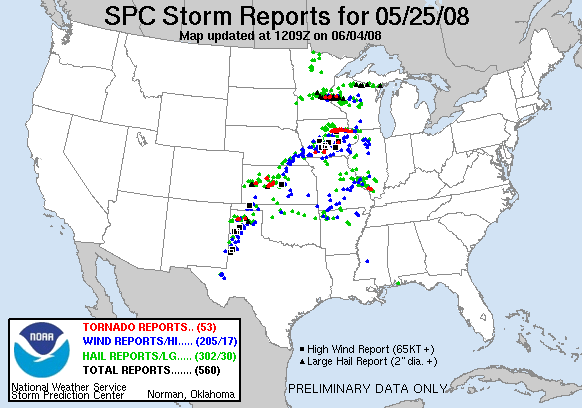 I noted on Friday that my Memorial Day plans included attending a regularly scheduled catfish fry on the Mississippi River. As it happened, my Sunday plans got blown up by the severe weather that blew up in eastern Iowa and southwest Wisconsin, including tornadoes, one of them an F5, that killed seven people in two Iowa communities. (This might have been the first time I recall Lancaster, where my in-laws live, and Ripon, where I live, being in the same tornado watch. At one point, tornado watches were in effect from Texas to northern Minnesota, and 50 tornadoes were reported from northern Texas to northern Minnesota Sunday.)
I noted on Friday that my Memorial Day plans included attending a regularly scheduled catfish fry on the Mississippi River. As it happened, my Sunday plans got blown up by the severe weather that blew up in eastern Iowa and southwest Wisconsin, including tornadoes, one of them an F5, that killed seven people in two Iowa communities. (This might have been the first time I recall Lancaster, where my in-laws live, and Ripon, where I live, being in the same tornado watch. At one point, tornado watches were in effect from Texas to northern Minnesota, and 50 tornadoes were reported from northern Texas to northern Minnesota Sunday.)In news that is likely to make emergency government managers and property and casualty insurers nervous, this tornado season is already the deadliest in 10 years, and, according to National Weather Service Storm Prediction Center warning meteorologist Greg Carbin, "Right now we're on track to break all previous counts through the end of the year."
That's interesting to note given that this has been a cold spring, or at least it seems that way. Actually, that may be a contributor to the storm-filled spring, given that, as we all know, clashing warm and cold air masses is what causes thunderstorms. We've certainly experienced the cold half of that equation this year (this morning's low was 36 in Appleton and 34 in Green Bay), with only two instances where the high has jumped above 80, and more below-normal temperatures predicted the next 10 days and in June.
On Sunday, the three TV stations — KWWL, KGAN and KCRG — in the Waterloo–Cedar Rapids TV market were on the air continuously from 4:22 p.m., when the first tornado warnings were issued, until midnight or later. They were doing what TV (and radio) is supposed to do — keep the public informed in the event of emergencies. Those stations have a policy, as some TV stations in this area do, of continuous coverage of tornado warnings, unlike the old days, when TV stations would break in for storm warnings, then go back to regular programming. In their case Sunday, that meant continuous coverage of continuous tornado warnings from about 4:25 to 10:30 p.m., and then again from about 11 p.m. until midnight after another round of tornado warnings. Those stations also had to figure out a way to coordinate warnings from three different National Weather Service offices, in Des Moines, Iowa, the Quad Cities of Iowa and Illinois, and La Crosse.
(The local tie-ins: KWWL’s Jeff Kennedy is a native of Oshkosh, and KCRG’s Joe Winters grew up in Princeton; both are University of Wisconsin graduates.)
In contrast, there is the Weather Channel, which touts itself as the CNN of weather. While storms were ripping up eastern Iowa, the Weather Channel instead was showing a marathon of “Forecast Earth,” their global warming propaganda show. Apparently, actual weather was not as interesting as showing off people driving what appeared to be a four-passenger golf cart, not to mention eco-friendly fashions.
One of the anchors of “Forecast Earth” is Heidi Cullen, whose confidence that we humans are ruining the planet is so complete that she has advocated that TV meteorologists who dare not sing from the global warming hymnal lose their accreditation from the American Meteorological Society. (A good analysis of this issue can be found here.) One wonders what the reaction of Cullen or her bosses would be if someone suggested a good way to combat global warming would be to turn off TV sets and computers.
So, Memorial Day morning, we picked up the Dubuque (Iowa) Telegraph Herald expecting to see in-depth coverage of Sunday’s tornadoes, especially since there were several tornado reports within the Telegraph Herald’s circulation area. What we got instead was one not-very-detailed story buried inside the newspaper about the Iowa tornadoes and one even shorter blurb about one tornado report east of Dubuque, also not on the front page — and an Associated Press blurb at that, not even generated by the newspaper itself.
When you read analyses questioning whether newspapers can keep up in the digital age, the deadline structure required to print a daily newspaper, for which the 24/7 news cycle is not convenient, could be the reason. But when a newspaper just doesn’t bother to exert itself, even on a holiday weekend, to cover news in its own coverage area, is that their digital disadvantage, or just laziness or poor management?

1 comment:
When we had the outbreak in 1996, people flooded the TV stations with calls because it was interfering with soap operas, movies and game shows. If it wasn't happening there, they didn't want to hear about it! I feel the reason for the record death toll so far is due to two things. 1. More violent storms
2. Public apathy, not paying attention to watches and warnings
Post a Comment